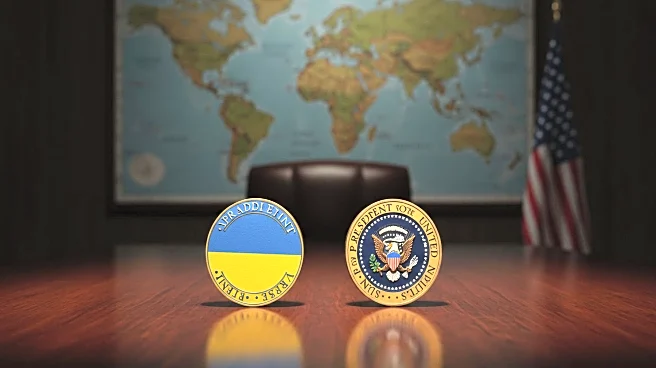What's Happening?
Ukrainian President Volodymyr Zelenskyy is scheduled to meet with U.S. President Donald Trump in Washington on Monday. This meeting follows a recent summit in Alaska between Trump and Russian President Vladimir Putin, which did not result in an agreement to halt the ongoing conflict between Russia and Ukraine. President Trump has shifted his stance, now advocating for a comprehensive peace agreement rather than a ceasefire, aligning with Putin's long-held position. Zelenskyy, who was not present at the Alaska summit, has expressed the importance of involving European leaders in the peace process. The meeting marks Zelenskyy's first visit to the U.S. since a contentious Oval Office meeting with Trump earlier this year.
Why It's Important?
The meeting between Zelenskyy and Trump is significant as it could influence the trajectory of the conflict between Russia and Ukraine. Trump's alignment with Putin's stance on seeking a long-term peace agreement rather than a temporary ceasefire may impact diplomatic efforts and negotiations. The involvement of European leaders is crucial for ensuring security guarantees for Ukraine. The outcome of this meeting could affect international relations and the geopolitical landscape, particularly in terms of U.S. and European involvement in the conflict resolution process. Stakeholders such as European nations and international security organizations are closely monitoring the developments.
What's Next?
Following the meeting, potential next steps include discussions on a trilateral summit involving the U.S., Ukraine, and Russia, as proposed by Trump. Zelenskyy has emphasized the need for strengthened sanctions if Russia does not engage in honest negotiations to end the war. European leaders are expected to co-host a video call to discuss monitoring and upholding any potential agreements. The international community will be watching for any shifts in diplomatic strategies and commitments from the involved parties.
Beyond the Headlines
The meeting could have deeper implications for U.S.-Russia relations and the role of the U.S. in global conflict resolution. Trump's approach may signal a shift in U.S. foreign policy, potentially affecting alliances and partnerships. The ethical and legal dimensions of negotiating with Russia, given its actions in Ukraine, are also noteworthy. Long-term shifts in international diplomacy and security strategies may be triggered by the outcomes of these discussions.










